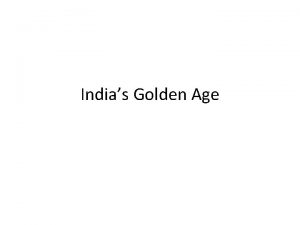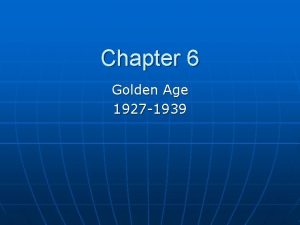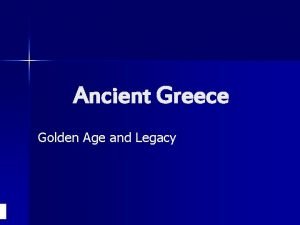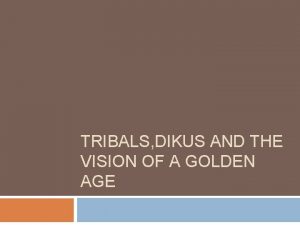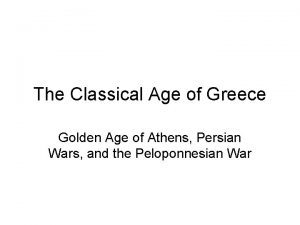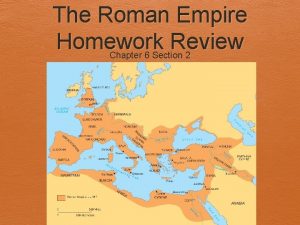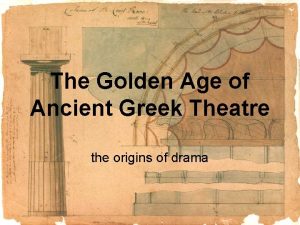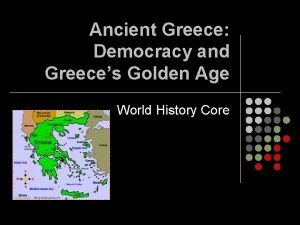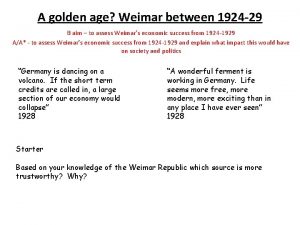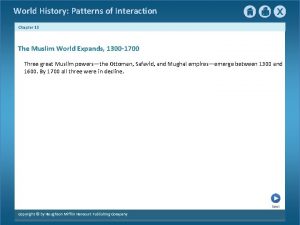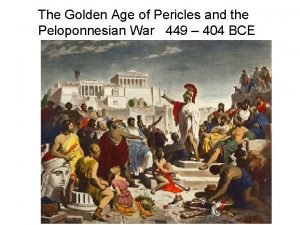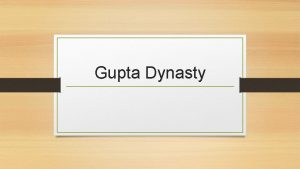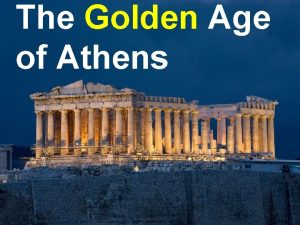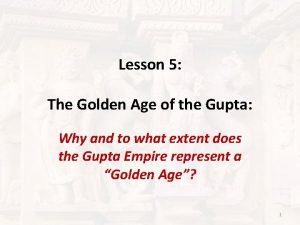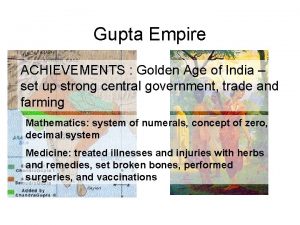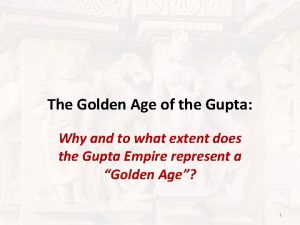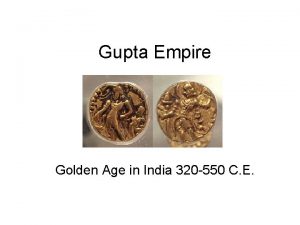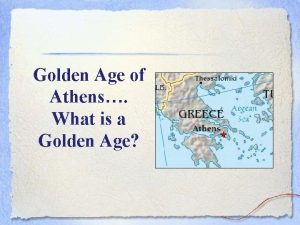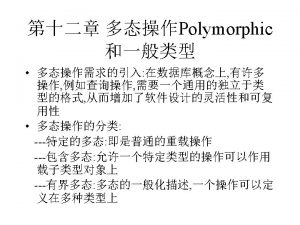Lesson 5 The Golden Age of the Gupta























- Slides: 23

Lesson 5: The Golden Age of the Gupta: Why and to what extent does the Gupta Empire represent a “Golden Age”? 1

What is a Golden Age? • Stop and Jot… what do you think a Golden Age is for a society? What would life be like during a Golden Age in a particular place? • Do you think that we live in a Golden Age today in the United States? Why or why not? 2

Golden Age • A Golden Age is a period of great peace, prosperity, and happiness in a particular area. • Period = significant length of time • Peace = free from war and violence • Prosperity = overall economic well-being for a society in general; many people in the society feel secure financially • Happiness = people generally feel good about their lives 3

The Gupta Empire is often described as a Golden Age for India. We will explore why and challenge you to use evidence to analyze how it was a Golden Age and to what extent (how much) it was “golden” for everyone in India. 4

Turn and Talk: Study both maps. The smaller map shows the Silk Routes, both on land sea. Was the Gupta empire in a good geographic location to benefit from Afroeurasian trade? 5

250 | 200 | 150 | 100 | 150 | 200 | 250 | 300 | 350 | 400 | 450 | 500 BCE CE Han Dynasty - 206 BCE to 220 CE Roman Empire – 27 BCE to 476 CE Kushan Empire – 30 CE to 375 CE Beginnings of Mayan Civilization 2000 BCE…………………………. . collapse by 900 CE Turn and Talk: Which empires on this timeline do you think the Guptas may have traded with? Who did they NOT trade with? Why do you think this? Be prepared to explain your thinking. Gupta Dynasty 320 CE to 550 CE 6

Chronology of the Gupta Empire • 320 : Chandragupta I founds the Gupta Empire. • 330 -376 : Samudragupta expands the empire from the Indus River to the Bay of Bengal, and up into the northern mountains. • 376 -415 : Chandragupta II makes the empire secure, and encourages trade. • 415 -450 : Kalidas composes most of his poetry in the reign of Kumargupta(415 -455). • 450 : Empire begins to collapse under pressure from invading Huns. • 554 : The Gupta dynasty ends when the last emperor Shashakgupta dies. 7

The Golden Age of the Guptas… why, for whom, and to what extent? As you read the articles and view the Power. Point and video, you need to consider two different claims about the Gupta. You will gather evidence to support both claims on your Gupta Golden Age Note Tracker. A claim is a statement that you can support with evidence but that can also be challenged. Claim 1: The Gupta Empire brought a Golden Age to India because of the great number of discoveries they made in many different areas of life, and also because of the peace and prosperity they obtained. Claim 2: Many advances were made in India during the Gupta Empire, but not everybody had the same opportunities. So while it may have been “golden” for some, it was not “golden” for everyone. 8

Innovations of the Gupta 9

Gupta Mathematics They developed: • the concept of zero • first base 10 number system which became the basis for Arabic numerals, the system used by most of the world today • the decimal system Turn and Talk: Which advance • the concept of pi do you think is the most important? Include this in your notes. 10

Gupta Science They: • identified the 7 primary planets hundreds of years before European scientists • developed the idea that the earth was round and moved around the sun • engaged in the scientific study of eclipses • explored the concept of gravity • advanced the practice and study of surgery and the practice of traditional Indian, or Ayurvedic medicine, which is still used today • vaccinated against smallpox hundreds of years before Europeans did Turn and Talk: Which advance do you think is the most important? Which would have made life better for people? Why? Include this in your notes. 11

Gupta Literature • The Hindu epic writings of the Ramayana and the Mahabbarata were completed and spread to all in the Empire during the Gupta empire. • These were some of the first works of epic literature in human history. • Sanskrit poetry, drama and art grew in importance. • Many fables and folktales were recorded through Sanskrit writing. 12

Gupta Arts and Architecture Amazing temples and palaces were built, and wonderful sculpture and other art forms were created as well. the 6 th century late Gupta period Dashavatara temple Deogarh, Uttar Pradesh 13

Hindu temples and shrines were built throughout the lands ruled by the Guptas. Gupta architecture was dedicated to building stone temples to the various Hindu gods. Also, Buddhists built shrines to house the remains of select holy people. These structures were called Stupas. This form of architecture made its way to China where it was altered slightly and renamed the pagoda. www. historybits. com/gupta. htm 14

Faxian Think-Aloud It is a time of peace. The people are numerous and happy. They do not have to register with the government, or answer to any judges and their rules. Only those who farm the royal land have to pay the royal government part of what they earn from the land. If the want to leave their land, they go, if they want to stay on their land they stay. 15

Caste System • What does this remind you of? • Did other societies have similar structures? Turn and Talk: • Whose experiences and stories do you think get explored the most when this time period is studied? • Whose voices might be missing from this story? 16

How do we know what we know about the history of the caste system? http: //www. nbcnews. com/science/indiascaste-system-goes-back-2 -000 -years-geneticstudy-6 C 10874609 17

The Laws of Manu: Primary Source Lesson • India’s most famous early legal code, The Laws of Manu were complied over the years between 200 - 400 C. E. While the position of women in early Vedic India had been good, these laws illustrate the efforts of the Brahmin elite to restrict women’s legal independence in this later period. • Pick two examples to focus on. With your Turn and Talk partner, answer these questions: – What does it say? What does it mean? – What does this mean for how different people experienced the Golden Age? 18

• “In childhood a female must be subject to her father, in youth to her husband, and when her lord is dead, her sons; a woman must never be independent. ” • • • What does it say? What does it mean? What does, this mean for to people how different experienced the Golden Age? • “A father sins unless he marries his daughter off when she reaches puberty. ” • “Women do not care for beauty, nor is their attention fixed on age; they give themselves to the handsome as well as to the ugly just for the fact that he is a man. ” • “A husband should be worshiped as a God. ” • “A wife, a son, and a slave, these three are declared to have no property. The wealth which they earn is acquired for him to whom they belong. ” • “If a woman should happen to merely to overhear recitations of Vedic mantras by chance, hot molten glass should be poured into her ears. ” 19

Global patterns • The Gupta Empire was similar to empires… – Technological and cultural advances – Social hierarchy… caste system and patriarchy • Rome… slavery and patriarchy • Han China… slavery, patriarchy • But how were the Gupta unique or different? 20

Turn and Talk, then write an Exit Pass: • Using all of your notes from the note tracker, answer the question… the Golden Age of the Gupta: Why is the time of the Gupta Empire considered a “Golden Age” for India, and to what extent (how much) was it “golden”? • Writing tip!! – This a two-part question, so develop a two-part answer! – Have one statement about why it was golden, – then use a transition like “However, ” “Nevertheless, ” or “At the same time, ” – and then write a statement about the limitations of the Golden Age. 21

Note Card Exit Pass • Side 1 - Why was it a golden age? • Side 2 – Who may not have enjoyed the golden age? 22

Property of Oakland Schools Authors: Stacie Woodward and Darin Stockdill Editors: Amy Bloom Academic Review: Ian Moyer 23
 Iron age bronze age stone age timeline
Iron age bronze age stone age timeline Iron age bronze age stone age timeline
Iron age bronze age stone age timeline Golden ratio the sacrament of the last supper
Golden ratio the sacrament of the last supper Modified fibonacci sequence
Modified fibonacci sequence Golden age of hollywood 1930s
Golden age of hollywood 1930s Shikabu
Shikabu India's golden age
India's golden age The golden age (1939-1956)
The golden age (1939-1956) Golden age of aviation 1927-1939
Golden age of aviation 1927-1939 Golden age greek mythology
Golden age greek mythology Tribals dikus and the vision of a golden age
Tribals dikus and the vision of a golden age The golden age of russian literature
The golden age of russian literature Golden age of greece
Golden age of greece Golden age of greek theatre
Golden age of greek theatre The golden age chapter 20
The golden age chapter 20 Age of history
Age of history Golden age of the roman empire
Golden age of the roman empire The word theater comes from greek and literally
The word theater comes from greek and literally Dba fanaticus
Dba fanaticus The golden age of comics graphic organizer
The golden age of comics graphic organizer Greeces golden age
Greeces golden age The golden age of weimar
The golden age of weimar The golden age chapter 18
The golden age chapter 18 Peloponnesian war
Peloponnesian war






